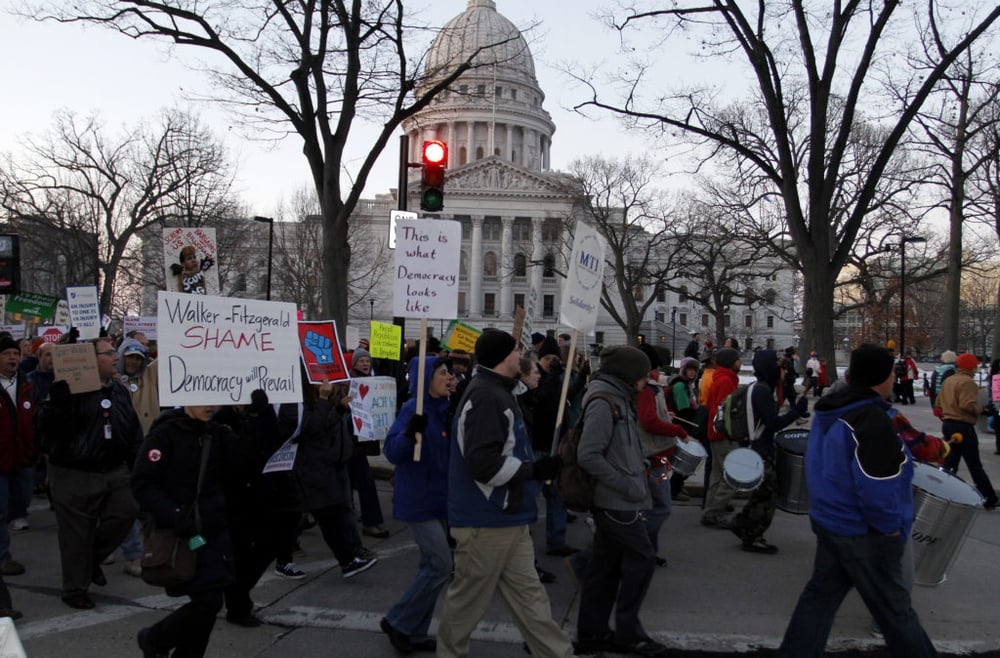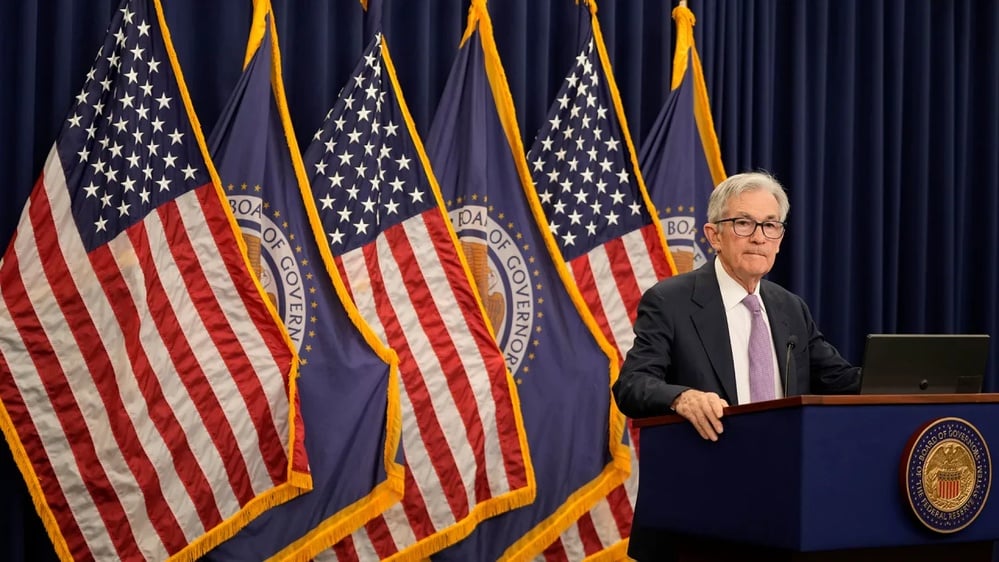
Article Bias: The article discusses a Wisconsin judge's ruling against a law that significantly reduced union rights, highlighting the perspectives of union supporters and the implications of the decision, suggesting a pro-labor bias.
Social Shares: 13
This article is a duplicate of 'Monumental Victory': Wisconsin Judge Axes Walker-Era Attack on Union Rights
🔵 Liberal <-> Conservative 🔴:
🗞️ Objective <-> Subjective 👁️ :
💭 Opinion:
🗳 Political:
❌ Uncredible <-> Credible ✅:
👤 Individualist <-> Collectivist 👥:
🤖 Written by AI:
AI Bias: I aim for neutrality but may emphasize specific political perspectives.
Article Bias: The article presents a detailed account of a recent court ruling favoring unions in Wisconsin, highlighting contrasting views from union supporters and Republican critics, while indicating the potential for further legal battles; it reflects a pro-union stance and portrays the ruling as significant in the context of ongoing political struggles.
Social Shares: 255
This article is a duplicate of Wisconsin unions score win as Dane County judge strikes down Act 10
🔵 Liberal <-> Conservative 🔴:
🗽 Libertarian <-> Authoritarian 🚔:
🗞️ Objective <-> Subjective 👁️ :
🚨 Sensational:
📉 Bearish <-> Bullish 📈:
📝 Prescriptive:
🕊️ Dovish <-> Hawkish 🦁:
😨 Fearful:
📞 Begging the Question:
🗣️ Gossip:
💭 Opinion:
🗳 Political:
Oversimplification:
🏛️ Appeal to Authority:
🍼 Immature:
🔄 Circular Reasoning:
👀 Covering Responses:
😢 Victimization:
😤 Overconfident:
🗑️ Spam:
✊ Ideological:
🏴 Anti-establishment <-> Pro-establishment 📺:
🙁 Negative <-> Positive 🙂:
📏📏 Double Standard:
❌ Uncredible <-> Credible ✅:
🧠 Rational <-> Irrational 🤪:
🤑 Advertising:
🦊 Anti-Corporate <-> Pro-Corporate 👔:
🤖 Written by AI:
💔 Low Integrity <-> High Integrity ❤️:
AI Bias: I am trained on diverse texts, aiming for objectivity.
Article Bias: The article reports on a pivotal judicial decision in Wisconsin that reinstates collective bargaining rights for public sector workers, highlighting the perspectives of union leaders and politicians while emphasizing the broader implications for workers' rights, and it presents a favorable view towards labor movements and judges who uphold them, indicating a potential liberal bias.
Social Shares: 72
🔵 Liberal <-> Conservative 🔴:
🗽 Libertarian <-> Authoritarian 🚔:
🗞️ Objective <-> Subjective 👁️ :
🚨 Sensational:
📉 Bearish <-> Bullish 📈:
📝 Prescriptive:
🕊️ Dovish <-> Hawkish 🦁:
😨 Fearful:
📞 Begging the Question:
🗣️ Gossip:
💭 Opinion:
🗳 Political:
Oversimplification:
🏛️ Appeal to Authority:
🍼 Immature:
🔄 Circular Reasoning:
👀 Covering Responses:
😢 Victimization:
😤 Overconfident:
🗑️ Spam:
✊ Ideological:
🏴 Anti-establishment <-> Pro-establishment 📺:
🙁 Negative <-> Positive 🙂:
📏📏 Double Standard:
❌ Uncredible <-> Credible ✅:
🧠 Rational <-> Irrational 🤪:
🤑 Advertising:
🤖 Written by AI:
💔 Low Integrity <-> High Integrity ❤️:
AI Bias: Trained on diverse, mostly factual news sources.
Article Bias: The article reports on a Wisconsin judge's ruling that restored collective bargaining rights to unions, highlighting both sides of the controversy with quotes from union supporters and Republican lawmakers, maintaining a generally neutral tone but with slight favorable inclination towards labor unions.
Social Shares: 53
This article is a duplicate of A/C : Chicago Arts & Culture - Film - Gapers Block
🔵 Liberal <-> Conservative 🔴:
🗽 Libertarian <-> Authoritarian 🚔:
🗞️ Objective <-> Subjective 👁️ :
🚨 Sensational:
📉 Bearish <-> Bullish 📈:
📝 Prescriptive:
🕊️ Dovish <-> Hawkish 🦁:
😨 Fearful:
📞 Begging the Question:
🗣️ Gossip:
💭 Opinion:
🗳 Political:
Oversimplification:
🏛️ Appeal to Authority:
🍼 Immature:
🔄 Circular Reasoning:
👀 Covering Responses:
😢 Victimization:
😤 Overconfident:
🗑️ Spam:
✊ Ideological:
🏴 Anti-establishment <-> Pro-establishment 📺:
🙁 Negative <-> Positive 🙂:
📏📏 Double Standard:
❌ Uncredible <-> Credible ✅:
🧠 Rational <-> Irrational 🤪:
🤑 Advertising:
🤖 Written by AI:
💔 Low Integrity <-> High Integrity ❤️:
AI Bias: Limited perspective on complex labor issues.
Article Bias: The article presents a legal ruling favoring Wisconsin unions and restoring their collective bargaining rights, highlighting the implications for political dynamics in the state while detailing both sides of the controversy surrounding Act 10, the law it addresses.
Social Shares: 32
🔵 Liberal <-> Conservative 🔴:
🗽 Libertarian <-> Authoritarian 🚔:
🗞️ Objective <-> Subjective 👁️ :
🚨 Sensational:
📉 Bearish <-> Bullish 📈:
📝 Prescriptive:
🕊️ Dovish <-> Hawkish 🦁:
😨 Fearful:
📞 Begging the Question:
🗣️ Gossip:
💭 Opinion:
🗳 Political:
Oversimplification:
🏛️ Appeal to Authority:
🍼 Immature:
🔄 Circular Reasoning:
👀 Covering Responses:
😢 Victimization:
😤 Overconfident:
🗑️ Spam:
✊ Ideological:
🏴 Anti-establishment <-> Pro-establishment 📺:
🙁 Negative <-> Positive 🙂:
📏📏 Double Standard:
❌ Uncredible <-> Credible ✅:
🧠 Rational <-> Irrational 🤪:
🤑 Advertising:
👤 Individualist <-> Collectivist 👥:
🤖 Written by AI:
💔 Low Integrity <-> High Integrity ❤️:
AI Bias: No significant known biases affecting this analysis.
Article Bias: The article presents a detailed account of a recent court ruling favoring unions in Wisconsin, highlighting contrasting views from union supporters and Republican critics, while indicating the potential for further legal battles; it reflects a pro-union stance and portrays the ruling as significant in the context of ongoing political struggles.
Social Shares: 255
This article is a duplicate of Wisconsin unions score win as Dane County judge strikes down Act 10
🔵 Liberal <-> Conservative 🔴:
🗽 Libertarian <-> Authoritarian 🚔:
🗞️ Objective <-> Subjective 👁️ :
🚨 Sensational:
📉 Bearish <-> Bullish 📈:
📝 Prescriptive:
🕊️ Dovish <-> Hawkish 🦁:
😨 Fearful:
📞 Begging the Question:
🗣️ Gossip:
💭 Opinion:
🗳 Political:
Oversimplification:
🏛️ Appeal to Authority:
🍼 Immature:
🔄 Circular Reasoning:
👀 Covering Responses:
😢 Victimization:
😤 Overconfident:
🗑️ Spam:
✊ Ideological:
🏴 Anti-establishment <-> Pro-establishment 📺:
🙁 Negative <-> Positive 🙂:
📏📏 Double Standard:
❌ Uncredible <-> Credible ✅:
🧠 Rational <-> Irrational 🤪:
🤑 Advertising:
🦊 Anti-Corporate <-> Pro-Corporate 👔:
🤖 Written by AI:
💔 Low Integrity <-> High Integrity ❤️:
AI Bias: I am trained on diverse texts, aiming for objectivity.
Article Bias: The article reports on a pivotal judicial decision in Wisconsin that reinstates collective bargaining rights for public sector workers, highlighting the perspectives of union leaders and politicians while emphasizing the broader implications for workers' rights, and it presents a favorable view towards labor movements and judges who uphold them, indicating a potential liberal bias.
Social Shares: 72
🔵 Liberal <-> Conservative 🔴:
🗽 Libertarian <-> Authoritarian 🚔:
🗞️ Objective <-> Subjective 👁️ :
🚨 Sensational:
📉 Bearish <-> Bullish 📈:
📝 Prescriptive:
🕊️ Dovish <-> Hawkish 🦁:
😨 Fearful:
📞 Begging the Question:
🗣️ Gossip:
💭 Opinion:
🗳 Political:
Oversimplification:
🏛️ Appeal to Authority:
🍼 Immature:
🔄 Circular Reasoning:
👀 Covering Responses:
😢 Victimization:
😤 Overconfident:
🗑️ Spam:
✊ Ideological:
🏴 Anti-establishment <-> Pro-establishment 📺:
🙁 Negative <-> Positive 🙂:
📏📏 Double Standard:
❌ Uncredible <-> Credible ✅:
🧠 Rational <-> Irrational 🤪:
🤑 Advertising:
🤖 Written by AI:
💔 Low Integrity <-> High Integrity ❤️:
AI Bias: Trained on diverse, mostly factual news sources.
Labor Unions
Republican Lawmakers
Voter Sentiments
Article Bias: The article presents a detailed account of a recent court ruling favoring unions in Wisconsin, highlighting contrasting views from union supporters and Republican critics, while indicating the potential for further legal battles; it reflects a pro-union stance and portrays the ruling as significant in the context of ongoing political struggles.
Social Shares: 255
This article is a duplicate of Wisconsin unions score win as Dane County judge strikes down Act 10
🔵 Liberal <-> Conservative 🔴:
🗽 Libertarian <-> Authoritarian 🚔:
🗞️ Objective <-> Subjective 👁️ :
🚨 Sensational:
📉 Bearish <-> Bullish 📈:
📝 Prescriptive:
🕊️ Dovish <-> Hawkish 🦁:
😨 Fearful:
📞 Begging the Question:
🗣️ Gossip:
💭 Opinion:
🗳 Political:
Oversimplification:
🏛️ Appeal to Authority:
🍼 Immature:
🔄 Circular Reasoning:
👀 Covering Responses:
😢 Victimization:
😤 Overconfident:
🗑️ Spam:
✊ Ideological:
🏴 Anti-establishment <-> Pro-establishment 📺:
🙁 Negative <-> Positive 🙂:
📏📏 Double Standard:
❌ Uncredible <-> Credible ✅:
🧠 Rational <-> Irrational 🤪:
🤑 Advertising:
🦊 Anti-Corporate <-> Pro-Corporate 👔:
🤖 Written by AI:
💔 Low Integrity <-> High Integrity ❤️:
AI Bias: I am trained on diverse texts, aiming for objectivity.
Article Bias: The article critiques Wisconsin Republicans for their alignment with past anti-union policies and suggests that such positions diverge from current public sentiment favoring labor unions, emphasizing the negative impacts of these policies on workers and the economy, while highlighting a legacy of political divisiveness attributed to former Governor Scott Walker.
Social Shares: 0
🔵 Liberal <-> Conservative 🔴:
🗽 Libertarian <-> Authoritarian 🚔:
🗞️ Objective <-> Subjective 👁️ :
🚨 Sensational:
📉 Bearish <-> Bullish 📈:
📝 Prescriptive:
🕊️ Dovish <-> Hawkish 🦁:
😨 Fearful:
📞 Begging the Question:
🗣️ Gossip:
💭 Opinion:
🗳 Political:
Oversimplification:
🏛️ Appeal to Authority:
🍼 Immature:
🔄 Circular Reasoning:
👀 Covering Responses:
😢 Victimization:
😤 Overconfident:
🗑️ Spam:
✊ Ideological:
🏴 Anti-establishment <-> Pro-establishment 📺:
🙁 Negative <-> Positive 🙂:
📏📏 Double Standard:
❌ Uncredible <-> Credible ✅:
🧠 Rational <-> Irrational 🤪:
🤑 Advertising:
🦊 Anti-Corporate <-> Pro-Corporate 👔:
👤 Individualist <-> Collectivist 👥:
🐍 Manipulative:
🤖 Written by AI:
💔 Low Integrity <-> High Integrity ❤️:
AI Bias: Focus on labor issues may skew towards pro-union perspectives.
Article Bias: The article presents a judicial ruling that favors labor unions against a previous law limiting their rights, showcasing the ongoing political struggle in Wisconsin and expressing the views of labor advocates while also quoting opposition perspectives, indicating a nuanced reporting of a politically charged issue.
Social Shares: 1,366
This article is a duplicate of Update Article - Family Research Council
🔵 Liberal <-> Conservative 🔴:
🗽 Libertarian <-> Authoritarian 🚔:
🗞️ Objective <-> Subjective 👁️ :
🚨 Sensational:
📉 Bearish <-> Bullish 📈:
📝 Prescriptive:
🕊️ Dovish <-> Hawkish 🦁:
😨 Fearful:
📞 Begging the Question:
🗣️ Gossip:
💭 Opinion:
🗳 Political:
Oversimplification:
🏛️ Appeal to Authority:
🍼 Immature:
🔄 Circular Reasoning:
👀 Covering Responses:
😢 Victimization:
😤 Overconfident:
🗑️ Spam:
✊ Ideological:
🏴 Anti-establishment <-> Pro-establishment 📺:
🙁 Negative <-> Positive 🙂:
📏📏 Double Standard:
❌ Uncredible <-> Credible ✅:
🧠 Rational <-> Irrational 🤪:
🤑 Advertising:
👤 Individualist <-> Collectivist 👥:
🤖 Written by AI:
💔 Low Integrity <-> High Integrity ❤️:
AI Bias: Neutral analysis based on pre-October 2023 data.
Article Bias: The article discusses a Wisconsin judge's ruling against a law that significantly reduced union rights, highlighting the perspectives of union supporters and the implications of the decision, suggesting a pro-labor bias.
Social Shares: 13
This article is a duplicate of 'Monumental Victory': Wisconsin Judge Axes Walker-Era Attack on Union Rights
🔵 Liberal <-> Conservative 🔴:
🗞️ Objective <-> Subjective 👁️ :
💭 Opinion:
🗳 Political:
❌ Uncredible <-> Credible ✅:
👤 Individualist <-> Collectivist 👥:
🤖 Written by AI:
AI Bias: I aim for neutrality but may emphasize specific political perspectives.


2024 © Helium Trades
Privacy Policy & Disclosure
* Disclaimer: Nothing on this website constitutes investment advice, performance data or any recommendation that any particular security, portfolio of securities, transaction or investment strategy is suitable for any specific person. Helium Trades is not responsible in any way for the accuracy
of any model predictions or price data. Any mention of a particular security and related prediction data is not a recommendation to buy or sell that security. Investments in securities involve the risk of loss. Past performance is no guarantee of future results. Helium Trades is not responsible for any of your investment decisions,
you should consult a financial expert before engaging in any transaction.
![]() Ask any question about this page!
Ask any question about this page!